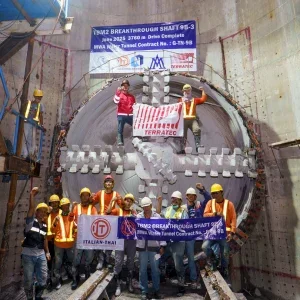The highway, which is expected to open in June, will provide a lifeline to the ethnic group, which is cut off from the outside half of every year due to heavy snow.
The tunnel forms part of a highway connecting the Dulongjiang township to the provincial highway network. The project has been underway for four years, according to China Daily.
At around 1:28 pm, explosives were set off, and news of the successful breakthrough in the 6.88km tunnel, the longest in Yunnan, broke to hundreds of workers and transportation officials who waited at the tunnel’s entrance.
The new tunnel had two construction teams working simultaneously from both ends, the Yunnan transportation department said.
Last month, President Xi Jinping congratulated workers on the highway and sent his wishes for a better life to members of the ethnic group.
Upon its completion, the highway will usher visitors to the border towns that neighbour Myanmar.
The government of Nujiang Lisu autonomous prefecture started the project in January 2011.
Dulongjiang township, which neighbours the Tibet autonomous region to its north, has been home to China’s Derung ethnic group for centuries, and about 70 per cent of the ethnic group lives there today.
The remote, mountainous area is known for being cut off from the outside world every year between October to late April because of heavy snow.
The distance from the township to Gongshan county will be shortened to 76km from the current 96km, and the traveling time between Dulongjiang and Gongshan will decrease to two hours from the current six hours, said Zhou Yong, manager of the tunnel project.
Zhou said that compared with another long tunnel in Medog county in the Tibet autonomous region, this one was more difficult because of the complicated rock formation and shortages of food, fuel and construction materials.
"Too much water oozed from the extremely unstable rock, making it hard to drill," Zhou said. "In addition, our work must stop for safety reasons when blizzards come. It means we can work for only six months a year."
In 2012, an excavator was crushed by collapsing rock. Fortunately, no one was seriously injured, Zhou said.
The remote construction site had no steady electricity, and Zhou had five diesel generators working continuously to fuel the heavy equipment.
"It’s tremendously difficult for us when the machinery breaks down. We have trouble finding the right components immediately because the county seat is 50km away. So we always had two machines of the same model, and replaced parts from one to the other," Zhou said.







